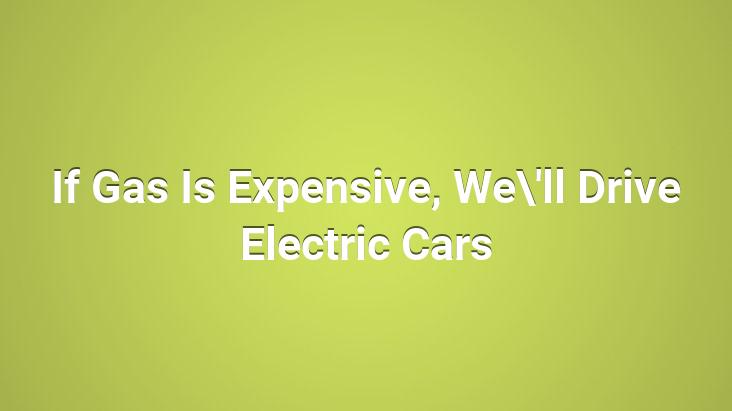Increasing fuel prices have peaked the Turkish consumer’s interest in electric cars.. However, it will not be easy to sell electric cars to Turkish consumers who are most interested in these cars in Europe.. First the prices need to decrease and then the ranges need to increase.
Opel’s model, Opel Ampera, which includes both electric and gasoline engines
Whether you go to international auto fairs in recent years, you can plug into the sockets at the stands. fitted cars do not escape your attention. The weight of these cars, which used to be very limited in fairgrounds, is increasing in fairs.. Although their weight on the roads is not that high for now.. Most of the manufacturers are making serious investments in this area with the prediction that the automobile market of the future will turn into electric cars.. So, what do consumers think about it? European consumers are quite positive in this regard.. There is a serious interest in these cars both in Europe and in Turkey.. However, in order for this interest to turn into serious sales figures, the industry needs to pay attention to the demands of consumers.
According to the “Electric Cars” survey conducted by TEB Cetelem in 10 European countries, including Turkey, 57 percent of European drivers are interested in electric vehicles and 49 percent express their readiness to buy these vehicles. TEB Cetelem General Manager Paul Milcent states that Turks show the greatest interest in electric vehicles across Europe.. While 93 percent of Turkish consumers show interest in electric vehicles; 82% say they are ready to buy these vehicles. In fact, the reason why the interest in these cars is so high in Turkey compared to other countries is hidden in the perspective of Turkish consumers towards these cars.. While the most important advantage of these cars for consumers of all countries except Turkey is that they are environmentally friendly, the primary advantage in Turkey is economic.. Increasing fuel prices in recent years have seriously affected Turkish consumers.. While a citizen paid an average of 0.58 lira in 2000 for the liter price of gasoline, now he pays more than 5 TL.. As fuel prices have risen more than inflation in recent years, Turkey has become the world’s largest LPG market.. In this respect, this interest of consumers towards electric cars is not surprising.. İbrahim Aybar, General Manager of Renault Mais, said, “Our estimation is that 10 years from now, 10 percent of total sales will be electric cars at the level of 2020.. But the general estimates are different.
The latest forecast report by Frost & Sullivan for Turkey was published last month.. It is said there that as of 2018, electric cars will be around 170,000 in Turkey.. They say that six of the brand’s products will be on sale.” It is surprising that interest in producing countries is less.. The main reason for this is that electric models have started to be launched in these countries.
They are also exposed to many brand advertisements in this regard.. They are more familiar with these cars. Therefore, they are aware of the high costs of these cars.. In Europe, where there is a serious economic crisis, the interest of the consumers of these countries is naturally lower than in countries such as Turkey and Russia.
On the other hand, this interest of Turkish consumers is not unconditional.. First of all, problems such as battery prices and short range of vehicles should be overcome.. “Battery prices are doubling the price of cars,” said Flavien Neuvy, Head of Cetelem Monitoring at BNP Paribas Consumer Finance.. 49 percent of Europeans do not want to pay more for an electric car than for an internal combustion engine.”. However, the prices of these cars are much higher than the price of conventional cars, even 30 percent.. Some brands go to lease batteries to overcome this problem.. The electric Renault Fluence ZE, produced in Turkey, is one of these models.
Renault can thus sell this car at a diesel Fluence price.. However, users who buy this car have to pay a certain rental fee to Renault every month for the battery.. According to the results of the survey, European drivers do not find this solution very sufficient.
63 percent of Europeans and 72 percent of Turkish drivers are not interested in such a solution.. Flavien Neuvy says, “People don’t understand why they have to pay rent for the battery of the car they buy.”. Although Europeans travel an average of 30 km a day with their cars, they want their cars to have a range of more than 250 km.
A car with a range of 100-150 km is sufficient for a European.. However, when they go on vacation, they are afraid of staying on the road.. 55 percent of Europeans and 61 percent of Turks state that they consider buying electric cars if their range is over 250 km.
The most important share in the spread rate of electric cars will be determined by fuel prices and oil reserves.. “40 years ago it was said that the world has 40 years of oil reserves.. Now it is said that the world has 40 years of oil reserves.
Oil extraction techniques are developing day by day.. Of course, as we continue to discover new oil fields, the development of electric cars will slow down,” Neuvy says, but adds: “Many times over the years, electric car projects have been launched by manufacturers and then stopped.. However, this time, the manufacturers have turned an important corner.”. Otherwise, these works of the manufacturers may have to be moved from the fairgrounds to the museum areas, just like the electric car works in the 1890s.
Note: This article was written on May 29, 2012.. Some information may therefore be out of date.







